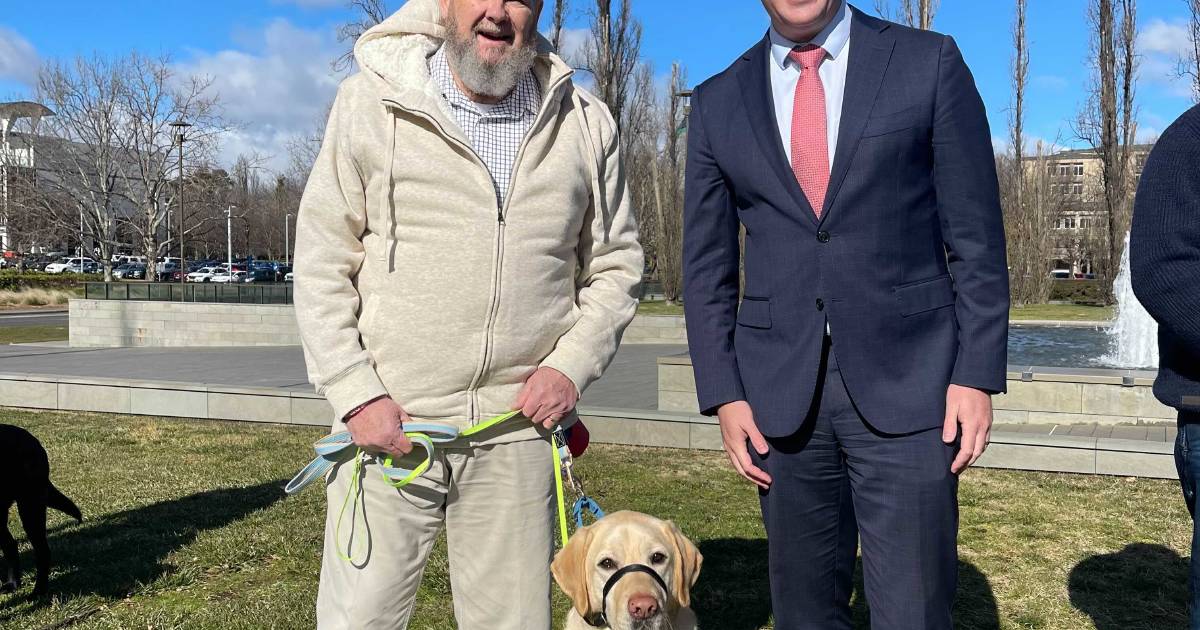- August 7, 2022
- No Comment
- 7 minutes read
DVA psychiatric assistance dog program for PTSD veterans, soldiers – Goulburn Post

Your digital subscription includes access to content from all our websites in your region. Access unlimited content, as well as The Canberra Times app.
Canberran Terry Greaves has spent most of his adulthood seeing psychologists, after navy service in the 1960s and ’70s left him with post traumatic stress disorder.
However, he says the introduction of a golden-haired psychiatric assistance dog called Nelson has changed his life.
Advertisement
“I’ve had Nelson now for just over nine months and he has made an amazing difference,” Mr Greaves said.
“He gives me the encouragement [and] the strength to actually leave the home.”
MORE VETERANS AFFAIRS:
The federal Labor government has announced an additional $22 million for the veterans affairs program which funds the dogs like Nelson.
Advertisement
An additional $33 million will be invested in provisional access to medical treatment for veterans, as they wait for claims to be processed by a backlogged veterans affairs department.
Minister Matt Keogh said there was a lot of preliminary evidence to support the dog program, which started in 2019.
“When I met with the veterans that have these psychiatric assistance dogs … their faces would light up with joy about how they think their life has improved,” he said.
“I was talking to someone who was not even leaving their bedroom. Having the dog meant they had to get up. They had to go and feed the dog. They had to take the dog out for a walk.”
Pups like Nelson, who was placed by Integra Service Dogs Australia, undergo intensive training.
After being assessed as too big to be a guide dog at about 18 months, Nelson was further trained for seven months to specifically assist a veteran.
The process costs around $40,000, Integra CEO and co-founder Ben Johnson said.
According to defence, rates of post traumatic stress disorder are higher among ex-service people than the general population.
MORE MENTAL HEALTH:
Advertisement
A dog may be trained to respond to a handler having a panic attack or trigger. Nelson has woken Mr Greaves from night terrors.
“He’s been able to pick up whatever vibe I’m giving off in the middle of the night. There’s this nice cold nose that nudges me in the back and wakes me up,” he said.
Mr Johnson said he had seen veterans go from housebound to seasoned travellers because of their service dog.
‘We’ve had veterans in the program who have been too fearful to leave their home for years … gone on domestic travel around Australia with their dogs for months at a time,” he said.
Mr Greaves welcomed the extra funding, and said he hoped it would help younger veterans.
Advertisement
However, one expert has said the psychiatric assistance dog program is a “distraction” from the real issues facing veterans.
Post-traumatic stress expert, the University of Adelaide’s Professor Alexander McFarlane, said dog program was “piecemeal”.
“They’re something that capture the media attention and have been funded in response to a very active lobby group,” he said.
“But it is not going to solve the mental health problems of veterans. You need a proper system of care. And it’s a distraction when the DVA tries to get brownie points for this.
“Specific programs like assistance dogs … are really an add-on service, they’re not the core of treatment that people require.”
MORE FEDERAL POLITICS:
Advertisement
Mr Keogh said the government was planning on implementing recommendations from previous reports and the Royal Commission into Defence and Veteran Suicide, which started in 2021.
“One of the things that government should do is implement the recommendations from those earlier reviews,” he said.
The commission is expected to table findings later this month.
We’ve made it a whole lot easier for you to have your say. Our new comment platform requires only one log-in to access articles and to join the discussion on The Canberra Times website. Find out how to register so you can enjoy civil, friendly and engaging discussions. See our moderation policy here.
Advertisement
I'm the federal politics bureau chief for the Canberra Times, via a career that's taken me from rural Victoria to Washington DC. Telling the stories of my local LGBTI community brought me to political journalism, where I've covered seven federal budgets, four national elections in two countries, Defence, public service and international governance.
I'm the federal politics bureau chief for the Canberra Times, via a career that's taken me from rural Victoria to Washington DC. Telling the stories of my local LGBTI community brought me to political journalism, where I've covered seven federal budgets, four national elections in two countries, Defence, public service and international governance.
I am a trainee at The Canberra Times. I currently cover breaking news, as well as an assortment of other random topics. I previously worked in digital news. Email tips or cute dog videos to [email protected].
I am a trainee at The Canberra Times. I currently cover breaking news, as well as an assortment of other random topics. I previously worked in digital news. Email tips or cute dog videos to [email protected].
Advertisement
Sign up for our newsletter to stay up to date.
We care about the protection of your data. Read our Privacy Policy.
Advertisement

